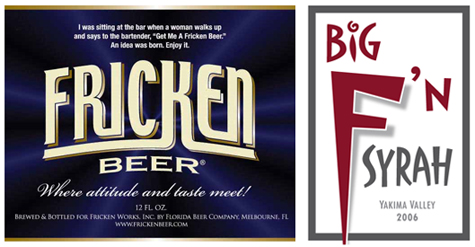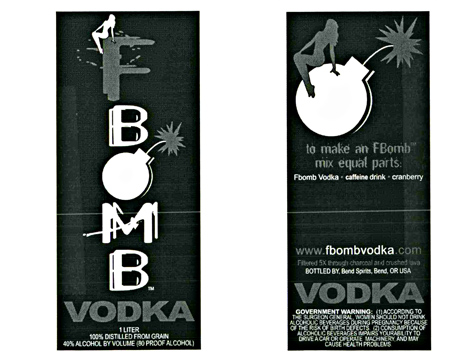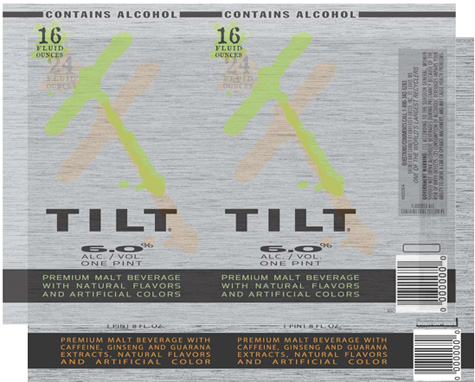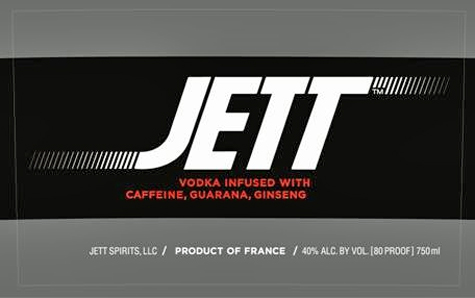Red Deer wine claims to be “Tree Free.” We could only guess that this means the labels are made from rice, or something other than trees. But no. The UPC label explains that the wine is “Untouched by oak – The ‘naturelle’ fruit characters of the wine are not overwhelmed by additives commonly introduced by man – LIKE OAK.” We are getting the impression they don’t like oak. The label says the producer is part of a sustainable resource initiative. It also refers to the “Intense body,” and TTB often disallows “intense” on table wines (where it suggests a high alcohol content). In other green beverages, Rainforest Gin claims it “Saves the Rain Forest with Every Bottle.” Of gin. Made in Cleveland.
Continue Reading Leave a Commentpolicy
F-Words, F-Bombs and Booze, Part 2

Yesterday we discussed a scholarly article on the F-Word, in F-Words, F-Bombs and Booze, Part 1. That post was long on discussion and short on examples, so here are several examples of approved labels, raising a similar term and topic. First and perhaps most famous is Effen Vodka. It’s possible the brand name refers to something other than what Potts is talking about, but somehow we believe they are thinking of roughly the same thing. As Potts explains, this term has always been mired in ambiguity, and that accounts for much of its power and popularity. The ambiguity also, we suppose, helps it get approved. Second is Fricken Beer, as above. Indian River Brewing, of Melbourne, Florida, is hoping you too will walk up to the bartender and say “Get me a Fricken Beer.” If you don’t get slapped, it might be refreshing. Third is Big F’n Syrah. It is a robust Yakima Syrah with overtones of the F-Word. We have a few additional F-Word labels but please let us know if you see others.
Continue Reading Leave a CommentTags: legally interesting/controversial, policy, risqué, sexual, sin, speech, would you approve it?
F-Words, F-Bombs and Booze, Part 1

Cary Wiggins alerted us to a recent, scholarly article about, of all things, the F-word. His blog, called Meeting the Sin Laws, covers the intersection of sin, vice, alcohol beverages, and the law.
Wiggins points to The Connotations of the F-Word. This is a post in The Language Log; it is a blog run out of the University of Pennsylvania since 2003. The post is by Chris Potts, a Professor of Linguistics at the University of Massachusetts, Amherst. He wants to get a better understanding of why people tend to remain so fascinated with this term (and other “taboo vocabulary”). He wants to know:
Does it in fact have sexual connotations even when used as an intensive, as in Bono’s “really, really f-ing brilliant”?
Ed. note: F-word modified. It’s not an idle topic; the FCC needs to grapple with this and so does TTB. Potts applies some fancy academics to this not so fancy topic, with cosine measures, cooccurrences, fleeting expletives, formal linguistic theories, latent semantic analysis, and even rubrics of framing. He does not necessarily conclude that the term has much to do with sex.
This topic has a fair amount of relevance here, because this terminology pops up on alcohol beverage labels more often than you...
Continue Reading Leave a CommentTags: legally interesting/controversial, media buzz, policy, risqué, sexual, sin, speech, would you approve it?
New Label Rules; Consumer Groups Press Obama Administration

On December 11th, several consumer groups submitted a letter to Treasury Secretary-Designate Geithner, urging fast action to require a great deal more information on beer, wine and spirits labels. The letter urges TTB and the Obama Administration to:
act now to issue a final regulation to require the following information on all beer, wine, and spirits labels: serving size, calories per serving, alcohol per serving, percent alcohol by volume, the definition of a “standard drink,” number of drinks per container, and the Dietary Guidelines recommendation on moderate drinking. TTB also should consult with FDA as to the most effective format and graphic design for the “Alcohol Facts” label.
The four consumer groups are the Center for Science in the Public Interest, the Consumer Federation of America, Shape Up America!, and the National Consumers League. They say they have been waiting more than five years since submitting their petition to change these rules. TTB’s 2007 proposed rule, and thousands of comments, are here.
Continue Reading Leave a CommentTags: legally interesting/controversial, media buzz, policy, serving facts/allergens
Is it Tilt without Caffeine?

Here is the tale of two Tilts. One was approved in June of 2007, and the other was approved a bit over a year later. The lower, older (orange) one claims caffeine, ginseng and guarana as ingredients. The upper, newer (green) one claims none of these things. Why? Lyke 2 Drink and The Syracuse newspaper reports:
Anheuser-Busch Inc. will stop producing caffeinated alcohol beverages under an agreement reached with attorneys general in 11 states, including New York, said Attorney General Andrew Cuomo said today. … Under the agreement, Anheuser-Busch will reformulate its Tilt malt beverage and Bud Extra beer to remove caffeine and guarana, a caffeine-bearing berry, company officials said.
This change seems to be well under way.
Continue Reading Leave a CommentTags: caffeine/secondary effects, legally interesting/controversial, policy
Caffeine

When it comes to the burgeoning category of alcohol beverages with caffeine, we think Sparks is one of the oldest, and Jett is one of the newest. Sparks is under fire from this lawsuit alleging it’s dangerous to mix alcohol and caffeine. As the bigger companies and brands come under attack and ease away (as in the case where Tilt removed the caffeine), this leaves a big, high-risk, high-reward opportunity for smaller brands such as Jett. Does anyone know of a brand approved for US-sale prior to Sparks (with alcohol and added caffeine, pre-mixed)?
Continue Reading Leave a Comment

